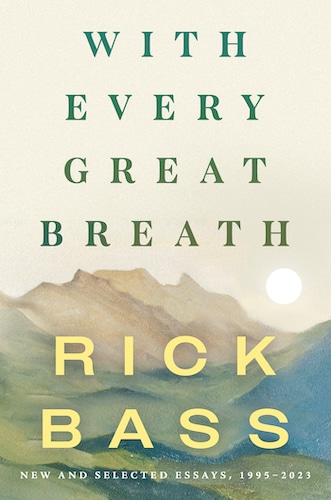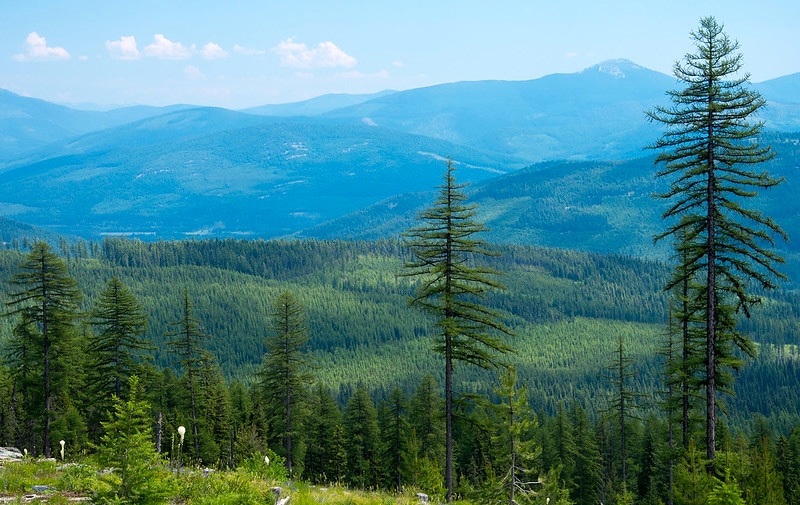[ad_1]
Rick Bass is an American writer of greater than thirty books, each fiction and non-fiction, on a variety of matters. An environmental activist, he’s additionally an artist drawn to the fantastic thing about the pure world. The winner of quite a few awards, his most up-to-date essay assortment, With Each Nice Breath, was launched this February by Counterpoint Press and contains three new essays together with a number of eighteen written over practically three a long time.

Counterpoint Press
Bass relies within the Yaak Valley in Montana. “It’s a land of extremes and superlatives,” he says. By means of the Yaak Valley Forest Council, Bass and a bunch of locals work to protect the valley from logging, and are additionally making an attempt to persuade the U.S. Forest Service to reroute the Pacific Northwest Path away from grizzly bear habitat, of which there are solely 25 remaining within the Yaak. He’s additionally concerned in a marketing campaign to make the Yaak a local weather refuge. The next are excerpts from a dialog with him from his dwelling in Montana, as he was making a chili dinner.
What makes the Yaak Valley particular?
Its uniqueness, its singularity, is its duality, basically a paradox. It’s two issues – the most important ecosystem driver is rocks, and but as a result of we’re on the fringe of the Rocky Mountains, a significant panorama driver can be fireplace. There’s a unprecedented quantity of organic range right here. Twenty-five p.c of the state of Montana’s checklist of delicate species are discovered on this one nationwide forest a good distance up within the northwest nook. It’s the wettest place in Montana, it’s the bottom elevation, it’s the northernmost.
Why ought to the Yaak Valley be thought of a local weather refuge? (Bass lately wrote about this right here.)
It’s a spot to protect this unimaginable habitat and variety to purchase a while and attempt to sluggish the speed of local weather change. That’s the place the advocacy for the outdated forests is available in. Traditionally, the Yaak was as a lot as 50 p.c outdated progress, and now there’s solely about 10 p.c outdated progress. Outdated progress is an unimaginable mechanism for storing carbon for long-term secure holding. The local weather refuge can be an experiment in what that may seem like – how would you go about returning the panorama to its historic vary of variability of outdated and mature forest.

The Yaak Valley from Garver Mountain, Kootenai Nationwide Forest, on July 9, 2012. U.S. Forest Service Pacific Northwest Area
The place does that marketing campaign stand proper now?
All campaigns take a very long time, however we’re continuing on the native, state and nationwide stage. All people we discuss to is enthused concerning the thought, however you recognize, authorities takes a very good whereas to enact it. There’s a couple of hundred million acres of outdated and mature forests on public land across the U.S., so our quarter-million acre proposal is fairly small.
How do you have a look at activism now, not just for you however for others, versus 20, 30, 40 years in the past?
With the passage of time, as populations develop and useful resource pressures accrue, it will get more durable and more durable to really feel that one particular person could make a distinction, or that even a bunch of individuals could make a distinction. As an activist and as an artist, it’s actually necessary for me to attempt to discover means and mechanisms for which individuals can really feel engaged. There’s quite a lot of donor fatigue on the market. It’d take extra creativity to turn into a profitable advocate now than up to now. That’s my expertise, in any case.
The title piece is concerning the previous and the way forward for pollution and activism. (The essay discusses the devastating well being impression of the mining of vermiculite from Montana.) The place are we headed? Are pollution getting worse, are the issues getting worse?
Once I began engaged on that, it was hyper-specific and intensely native. One of many least populated elements of western Montana, one of many largest geographic areas and counties within the state of Montana. Once more, I assume a standard theme was out of sight from the general public eye. The elimination of fact that reporting can convey to any difficulty. Anyone who’s bought their head out of the sand and is wanting round on the world is, I feel, conscious of the great and evil battle between the 2 main political events on this nation, making an attempt to find out whether or not these issues be regulated and accounted and monitored, or not, and it’s, together with local weather change, the battle of our time.
You write in a brand new essay, “Who is aware of how we come to issues?” Would you say that you simply come to issues by searching the window?
Once I’m writing, I’m searching the window, however after I’m writing I’m participating with my expertise with the 5 senses, the bodily world and my expertise in it. I’m actually lucky to stay right here in such a singular panorama, the place quite a lot of these experiences are singular, so it’s an incredible place to be a thinker in addition to an activist.
You labored as an oil and fuel geologist in Mississippi earlier than transferring west. Whenever you first moved from these areas to Montana, had been you struck by that a part of the world?
I didn’t transfer to Montana intending to inform individuals what Montana was like. I moved to Montana as a result of I missed the west. After that first 12 months within the valley in 1987, I spotted what was being misplaced, and the speed it was being misplaced, and the violence with which it was being misplaced. And I believed, I’ll cease writing fiction for a short while and I’ll spend a while writing about what’s happening out right here. It’s been 37 years.
You’ve written about canines, caribou, rhinos. What about animals appeals to you as a author and an individual residing on the earth?
What impresses me about animals, whether or not domesticated or undomesticated, is the diploma of their fittedness to the world. They’ve been right here loads longer than our personal species, they usually have realized to accommodate with energy and beauty, the world. And we’re nonetheless working at it. I’m by no means round them with out experiencing amazement, admiration, respect. We’ve got a protracted option to go. We simply bought right here.
What concerning the Anthropocene? What’s your thought on that?
We’ve got simply arrived right here. Reasonably than studying to suit the world and combine gracefully and with connection to the entire remainder of the world, we appear to have skated previous that step in growth, and are merely making an attempt to form it to our wishes with out the deep engagement of data. And the results are writ giant within the script of distress.
What do you suppose the ultimate extraction may seem like? When the ultimate drop of oil, or the ultimate piece of coal is taken out of the bottom? What would that second be like?
There’s a line that involves thoughts from Peter Matthiessen in his first e book of his trilogy, a couple of poacher within the Everglades. A shopper was asking the place he might procure some uncommon feather… The poacher studied on it and answered with some remorse, Properly, I imagine all of these fairly little birds have accomplished flown away. I feel that may be the response to the final barrel of oil or final flip of coal taken. I imagine it’s all gone away. You already know, with absolute lack of possession within the leave-taking.
[ad_2]
Source link



